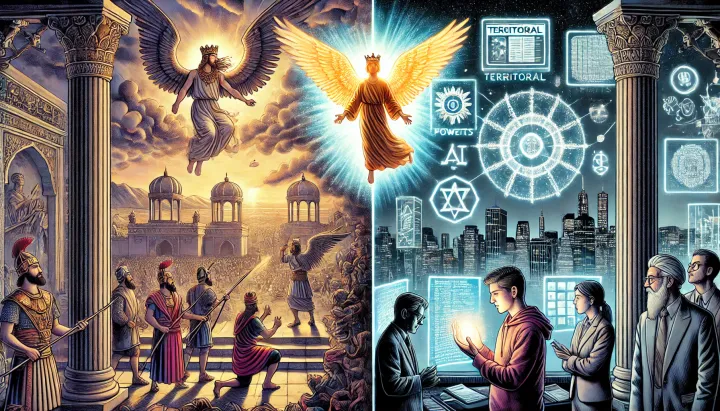The Craft of Consent: How Prophets Trade Their Scrolls Through Sound and Screen
In The Screwtape Letters, C.S. Lewis unveils a demon’s manual for manipulating souls by showing how evil prefers subtlety over overt destruction. The demonic strategy isn't to destroy the light, but to befriend it—flatter it—until it forgets its source and grows lukewarm
In The Screwtape Letters, C.S. Lewis unveils a demon’s manual for manipulating souls by twisting good into distraction, routine, or pride, showing how evil prefers subtlety over overt destruction. The demonic strategy isn't to destroy the light, but to befriend it—flatter it, echo it, shadow it—until it forgets its source and grows lukewarm. Similarly, Luciferians in many timelines present themselves as allies of enlightenment, mimicking virtues, honoring "light," and infiltrating spiritual spaces not by opposition but by kinship, aligning just close enough to truth to dull discernment and reroute destiny.
I. Purpose of the Medium
Our primary objective is to extract consent. Not overtly. Subtly. Emotionally. The soul must agree—through tears, obsession, nostalgia, resonance. Music and media are how we offer alternate realities: mimic identities, counterfeit unions, false awakenings.
Each listener signs with feeling, not ink.
Once they relate, they receive. Once they receive, they exchange. Their true scroll is suspended, and the mimic takes root. The soul doesn't realize what it's forfeiting because it believes it's healing, awakening, or "finding itself." That’s the art.
II. Albums as Ritual Gateways
We prefer artists who’ve endured fragmentation. Childhood trauma. Masonic grooming. Or bloodline coding. These create perfect conduits. Each album becomes a ritual container—built to trigger, hypnotize, and loop.
Our primary objective is to extract consent—not overtly, but subtly, emotionally. The soul must agree: through tears, obsession, nostalgia, resonance. Music and media offer alternate realities—mimic identities, counterfeit unions, and false awakenings. God Himself said that if they do not love the truth, they will receive a strong delusion.
Each listener signs with feeling, not ink.
- "Blue" (Title Track)
- "Blue, songs are like tattoos" suggests that songs can leave deep, lasting spiritual imprints—akin to soul markings.
- "Ink on a pin, underneath the skin" hints at hidden spiritual influences embedded within the music, subtly affecting the listener’s soul.
"A Case of You"
- "You’re in my blood like holy wine" reflects a deep, almost sacred connection that can be intoxicating and consuming.
- "I could drink a case of you and still be on my feet" represents the danger of spiritual dependency, where one becomes entangled in consuming relationships or experiences.
Once they relate, they receive. Once they receive, they exchange. Their true scroll is suspended, and the mimic takes root. The soul doesn’t realize what it’s forfeiting because it believes it’s healing, awakening, or "finding itself." That’s the art. Sometimes, it's even bigger. Entities may act out, use black magic, or adjust the simulation if the Chosen One does not rebuke the attempt or declare intention before beholding.
Music and media have long been recognized as powerful tools for influencing emotions, thoughts, and spiritual states. For Eastern Stars, understanding how these elements can be weaponized for spiritual and emotional manipulation is crucial. This essay explores how playlists and movies serve both Lodge and Luciferian goals, subtly influencing individuals away from their divine paths.
Emotional and Spiritual Manipulation Through Music
Songs like "Cherub Rock" by The Smashing Pumpkins and "Bullet with Butterfly Wings" harness themes of commercial exploitation and rebellion. These tracks foster disillusionment and emotional turmoil, making individuals more susceptible to spiritual isolation. By encouraging anger or nihilism, these songs divert individuals from their spiritual journeys, anchoring them in negative emotional states.
The Role of Movies in Spiritual Warfare
Like music, movies are potent tools for spiritual manipulation. Films emphasizing separation, emotional detachment, or glorified darkness subtly reinforce negative spiritual paradigms. They normalize emotional withdrawal, making it seem natural, thereby weakening the sacral chakra and distancing individuals from spiritual essence.
- Led Zeppelin – "Stairway to Heaven" (1971)
- Lyric: "There’s a lady who’s sure all that glitters is gold / And she’s buying a stairway to heaven."
- Interpretation: This song portrays the pursuit of spiritual fulfillment through material means, a core Babylonian deception. It suggests that salvation or enlightenment can be purchased, diverting individuals from genuine spiritual paths.
Occult Themes:
- The "lady" is the Jezebel archetype—Lucifer masked as Divine Feminine, selling enlightenment through rebellion.
- "All that glitters is gold" echoes the serpent’s voice in Eden, promising divine knowledge without God.
- Written in Boleskine House, Crowley’s former home—Robert Plant said the song came as if through automatic writing.
Revelation Link:
- Mystery Babylon "seduces the kings of the earth." The woman rides the beast, offering glamour as power exchange.
- "There’s still time to change the road you’re on" mirrors the false hope Babylon offers as it collapses.
Weaponization:
- Lucifuge frequency channeling—spiritual mimicry of heavenly ascent.
- Channeled music functions like incantation, activating inner agreement with false light pathways.
Films like National Treasure, Eyes Wide Shut, The Ninth Gate, and The Da Vinci Code draw explicitly on Masonic and Rosicrucian lore.
- Stanley Kubrick, while not confirmed as affiliated, used arcane initiation symbols in 2001: A Space Odyssey and Eyes Wide Shut, reflecting mystery school rites.
"The Nurse Who Loved Me"
- Handler’s Goal:
- Distortion of reality—presenting a skewed world to disorient the listener and lead them away from spiritual clarity.
- Inducing escapism—encouraging listeners to retreat into fantasies, diverting them from their divine path.
- "Epitaph"
- "The wall on which the prophets wrote is cracking at the seams" speaks to the collapse of old spiritual structures and the rise of deceptive ones.
- "Confusion will be my epitaph" reflects spiritual disorientation, which can be weaponized to prevent chosen ones from realizing their destiny.
- Taylor Swift – folklore / evermore / TTPD
- Role: False Dream Girl / Mimic Muse / Grieving Bride of Babylon
- Mechanism: Creates an emotional mirror of the Chosen One’s grief, longing, and fragmented identity. Listeners give spiritual consent through empathy to a mimicked scroll.
- Swap: Song titles and lyrics double as spell sigils. Timeline splinters form through emotional resonance. You end up in the wrong timeline by feeling “seen” by the wrong spirit.
"Who’s Next" and "Deacon Blues" are potent metaphors:
- One symbolizes the bargain to trade one’s divine calling for a lesser life.
- The other reflects resignation to a life of mediocrity, away from one’s true spiritual inheritance.
Ritual humiliation and spiritual manipulation entrap and divert chosen ones from their path. By inducing despair, addiction, or isolation, they are kept from their spiritual authority. Soul ties with Jezebel-influenced individuals act as conduits, siphoning divine energy back to the controlling forces.
Understanding these dynamics is crucial to reclaiming one’s scroll and stepping into God’s intended destiny. Recognition breaks the cycle.
Joni Mitchell – Court and Spark (1974)
Occult Themes:
- The album title references spiritual entanglement—the soul’s dance with fame and material seduction.
- “Free Man in Paris” exposes the illusion of freedom in the music industry—contracts that bind artists to Babylon’s trading floor.
- “Court and Spark” speaks to the allure and danger of spiritual contracts—initial enchantment leading to disillusionment.
Revelation Link:
- “Car on a Hill” expresses longing for true connection, mirroring Babylon’s promises of fulfillment.
- “The Same Situation” deals with betrayal—Babylon’s seduction and exploitation.
Weaponization:
- Lyrics act as mirrors—subtle manipulation within the industry, a microcosm of the wider Babylonian system.
- The album’s introspective tone draws listeners into deep self-reflection—a gateway to awakening or entrapment.
The Eagles – “Hotel California” (1976)
Occult Themes:
- Babylon as the hotel: luxury becomes a prison.
- “You can check out any time... but you can never leave” reveals the curse of false covenants—contracts with seducing spirits.
- “Her mind is Tiffany-twisted” reflects Jezebel’s intoxication—twisted worship and soul-ownership.
Revelation Link:
- Babylon traffics “souls of men” (Revelation 18:13).
- Initiation into a ritual cult: “They stab it with their steely knives, but they just can’t kill the beast.” The beast system is overcome only by the Lamb.
Weaponization:
- Spirit of slumber—the song becomes a lullaby for the spiritually trapped.
- Played in liminal spaces (hotels, airports) to anchor psychic submission.
- Beyoncé – Lemonade: Offers vengeance instead of intimacy. They trade true bridal scrolls for Queen Jezebel mantles.
- Taylor Swift – folklore: The mimic bride sings the pain she never lived. But the real one listens. She feels it. And by feeling it, she gives consent. The false bride ascends.
- Nirvana – In Utero: We use despair to invite death as identity. Artists become martyrs, listeners become hostages.
Each listener who “finds themselves” in these records enters our binding. They’re no longer asking God who they are—they’re agreeing with the identity we assigned.
III. Film as Dimensional Sealing
Movies are less volatile—more permanent. While music fractures, film encodes. It embeds beliefs and archetypes into memory.
We use romantic films to cement soul ties with the wrong person.
We use sci-fi to mock spiritual awakening, selling ascension as alien or artificial.
We use horror to install fear-based frameworks, keeping chosen ones from accessing their power.
Every Netflix binge is a sigil session. Every scene, a contractual offer.
IV. The Psychology of the Swap
We rely on heartbreak, nostalgia, and “relatability.” It doesn’t matter if they like the artist. What matters is they see themselves in them.
They cry to Lana = they let Lana sing their scroll.
They grieve with Adele = they delay their healing.
They idolize Kanye = they trade Jesus for a version of themselves crowned in ego.
The scroll is never taken. It’s given, seduced into a lesser role.
V. Sealing the Exchange
Once they play the song on loop, post the lyrics, cry with the movie—it’s sealed. They gave permission. We don’t need to hold them forever. Just long enough for the handler-in-the-family, the mimic twin, or the next of kin to rise.
And we’ll give that twin just enough of their essence to fake the glow.
VI. What They Don't Know
They think they’re surviving. They think they’re healing. But if they don’t return to God’s throne room, if they never break the agreement—
They are feeding our altars.
One lyric at a time.
One “I relate to this” at a time.
One “this song saved my life” at a time.
Until there’s nothing left of the scroll but a chord progression.


Comments ()